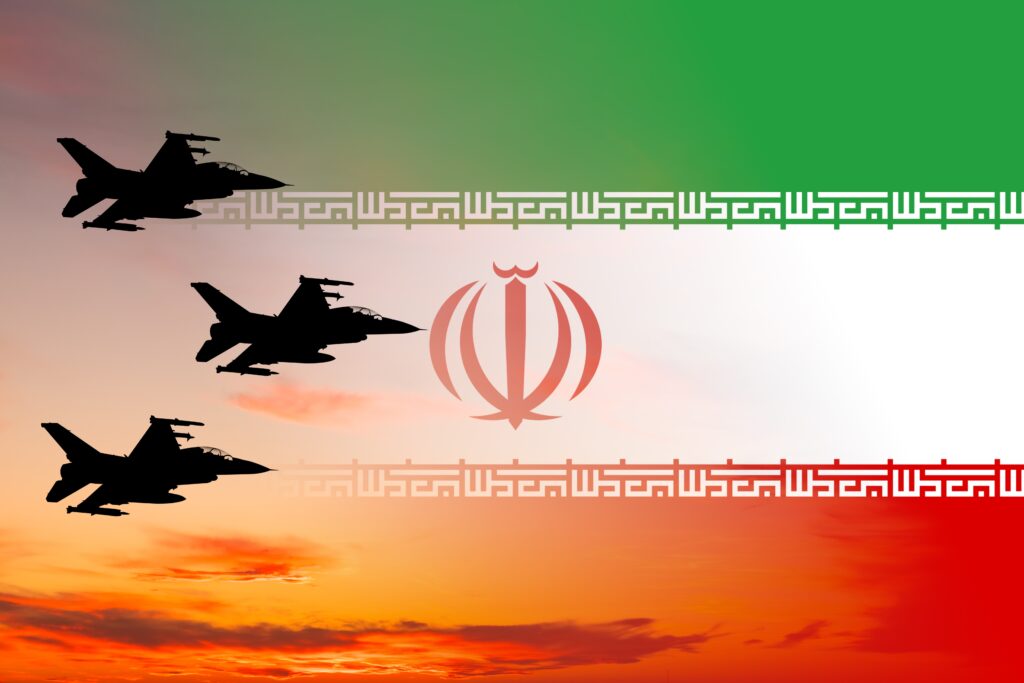Interviews
26 June 2025
Israel–Iran War: Is a Resumption of Nuclear Negotiations Still Possible?

Since 13 June and the launch of Israel’s “Rising Lion” operation against Iran, a new phase of military escalation has begun, directly involving the United States. From daily ballistic exchanges to Washington’s airstrikes, several strategies are now emerging as a ceasefire has been declared. What are the prospects for resuming negotiations on the Iranian nuclear programme? To what extent could this military episode affect the stability of the regime in Iran? And what conclusions can be drawn from the Israeli-American military manoeuvres? Analysis by Thierry Coville, Research Fellow at IRIS and Iran specialist.
While Washington was urging Tehran to sit down at the negotiating table with Tel Aviv, U.S. airstrikes on Sunday 22 June targeted three Iranian nuclear sites (Fordow, Isfahan and Natanz). How can Trump’s double approach to Iran be explained?
From the Iranian side, negotiations with the United States were accepted with some reluctance, particularly from the most radical elements and from Supreme Leader Ali Khamenei, who initially refused any engagement with the Americans. This surprising reversal can be explained by several factors, including Donald Trump’s electoral promises to disengage from international conflicts, as well as the political support of a Republican-majority Congress, which suggests favourable conditions for a more robust and sustainable agreement than the one concluded in July 2015 on Iran’s nuclear programme.
Thus, the Israeli and then American strikes on Iranian nuclear and military facilities came as a major surprise, especially with a sixth round of negotiations scheduled to take place.
Donald Trump’s initial statements—confusing as they may be—suggest that the Pentagon was aware of the operations Benjamin Netanyahu was about to launch. The first question that arises is: why didn’t he intervene? Why did he allow these attacks to go ahead, knowing they would sabotage the talks? The contradiction is glaring.
Already betrayed by Donald Trump in May 2018, when he withdrew from the 2015 agreement despite Iran’s compliance, this new betrayal, occurring in the middle of negotiations, will inevitably harden the Iranian position. The shock that caught Tehran off guard has also shaken the international community.
The U.S. strategy is all the more questionable given the uncertainty surrounding its effectiveness. There are doubts about the impact of the strikes on uranium enrichment sites, particularly Natanz and Fordow. The Israeli army has claimed it has “delayed by two or three years” the point at which Iran could acquire a nuclear weapon, although its stated goal was to neutralise the nuclear threat—despite the fact that Iran had not opted for weaponisation. The second objective was to reduce Tehran’s ballistic capabilities. Yet this very arsenal allowed Iran to endure and even retaliate.
All that for this?
In response to the strikes, Iran retaliated during the night of 23 June by targeting a U.S. military base in Qatar. The American president then demanded a “ceasefire” between Tehran and Tel Aviv. What scenarios are now on the table for Iran in this conflict?
Given the volatility of the situation, caution is needed.
A positive scenario would involve genuine negotiations taking place and the ceasefire being upheld.
For that to happen, talks must resume based on previous progress. One such proposal was the U.S. suggestion of a regional consortium for nuclear electricity production—a proposal accepted by Iran and a major breakthrough, as it would have included Saudi Arabia.
However, it is difficult to imagine a calm dialogue when Donald Trump has consistently contradicted himself. Moreover, despite the progress made and the media coverage, negotiations still faced numerous deadlocks. Among the sticking points was Iran’s domestic uranium enrichment—a point that Steve Witkoff and Donald Trump repeatedly tried to curb. After suffering strikes that killed many civilians and officials—including senior government figures—it will be extremely difficult for Iran to make concessions on this issue.
Any potential dialogue will require flexibility on Trump’s part, particularly regarding civilian nuclear activity under the supervision of the IAEA, as outlined in the 2015 agreement.
In terms of Iran’s military capabilities, caution is still warranted. However, this episode will likely strengthen the Iranian belief that they are on their own. They can no longer rely on international law and must bolster their defences, especially their ballistic programme. For them, this is now an obvious conclusion.
In seeking to dismantle Iran’s nuclear programme, Benjamin Netanyahu claimed he wanted to destabilise the current regime and bring about regime change—a goal that, for now, seems unlikely. What impact has this escalation had on Iranian domestic politics and the regime of the mullahs? How has the population reacted?
Great caution is required. According to BBC Persian, reality diverges sharply from Benjamin Netanyahu’s expectations. Addressing the Iranian people directly, Netanyahu had hoped for mass street protests in support of the Israeli strikes and the return of the Shah’s son. None of the observed demonstrations matched those expectations.
It appears that Iranian nationalism has taken precedence over political grievances. In other words, while many Iranians are critical of the Islamic Republic, the external threat has rallied them around their national identity. Another missed objective.
More significantly, this episode could reinforce the narrative promoted by hardliners and Ali Khamenei, offering them the chance to frame Iran’s response as courageous resistance to surprise attacks in a profoundly asymmetric conflict, where the country lacks an air force capable of preventing such assaults. The risk is that the most radical factions feel emboldened by the narrative of an Iran that “resisted” and use this momentum to block any effort to moderate both domestic and foreign policy.
Will moderates, such as President Massoud Pezeshkian, seek to use this moment of national unity to advance reforms, despite fierce opposition from ultra-conservatives in many areas? Will they use this unity to demonstrate some flexibility in negotiating with the United States?
These questions remain unresolved and will shape Iran’s domestic political landscape in the coming weeks.

